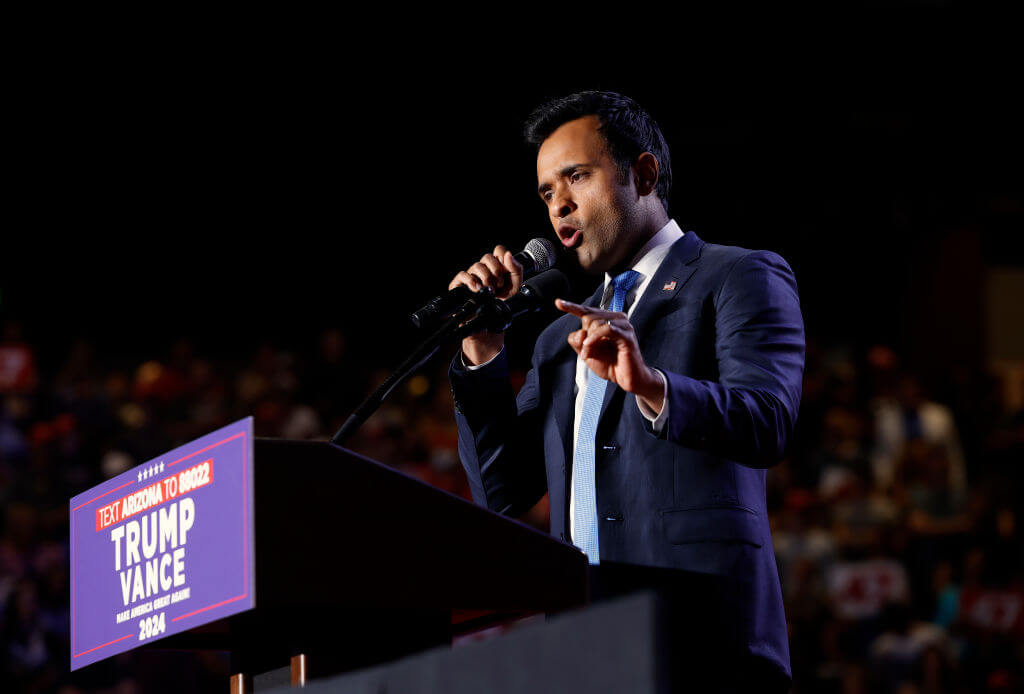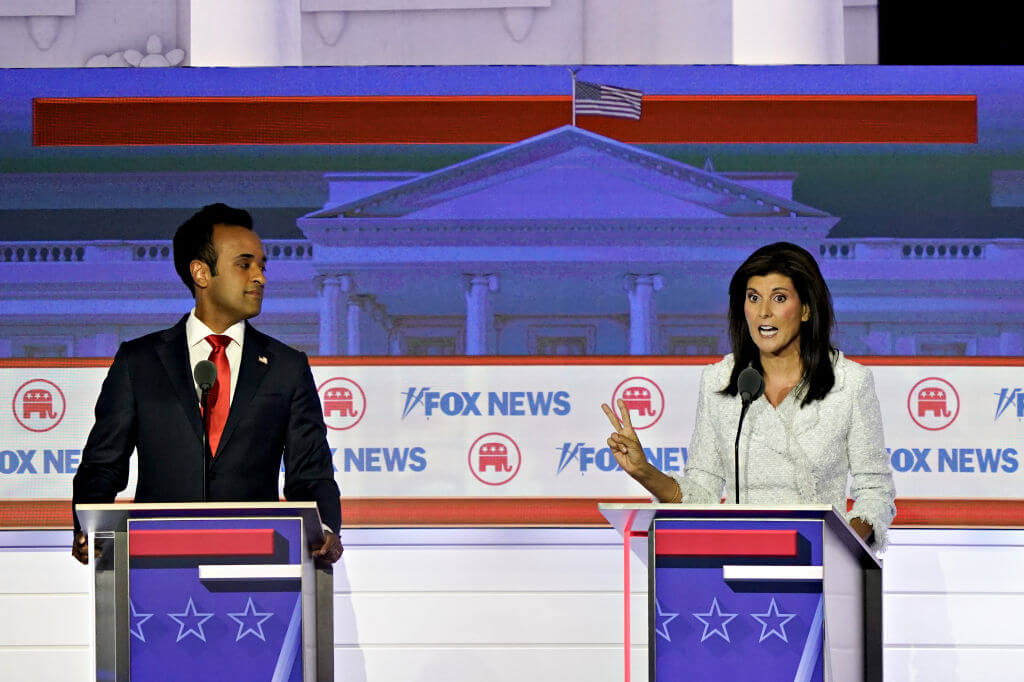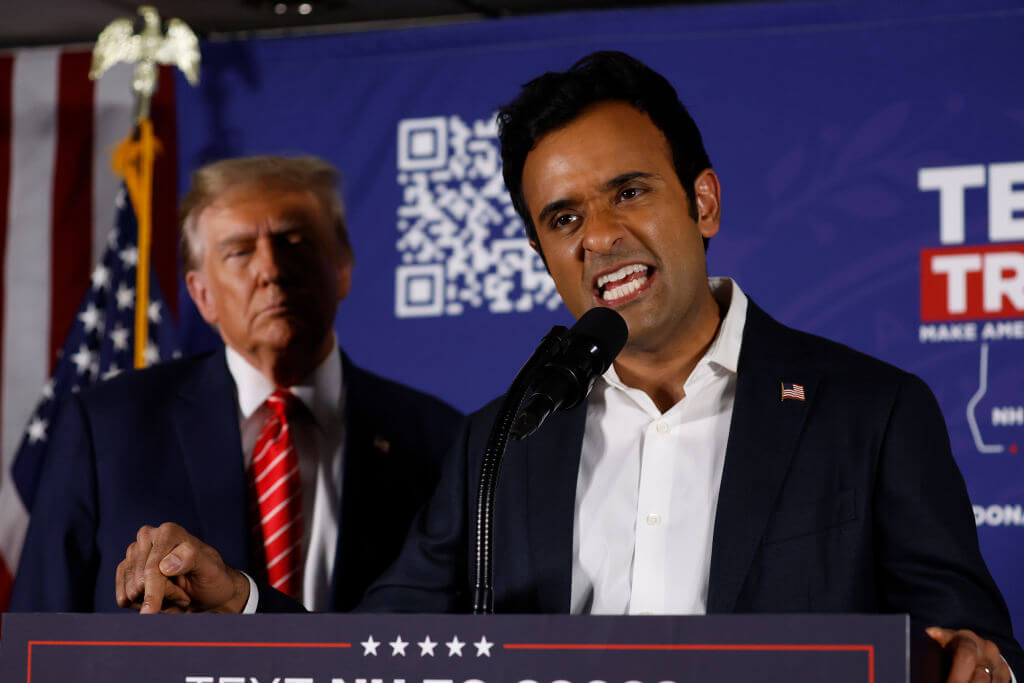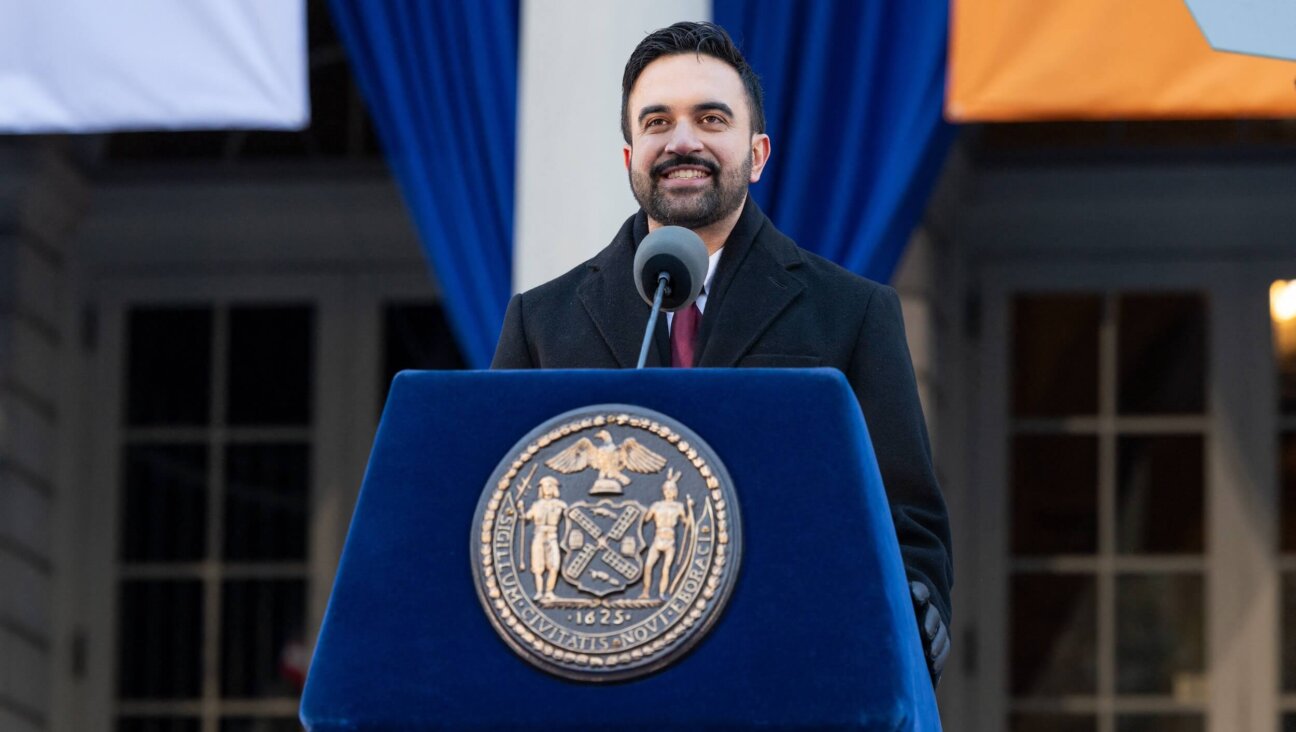If Vivek Ramaswamy becomes Secretary of State, his ‘America First’ ideology could complicate U.S.-Israel relationship
Ramaswamy has previously suggested cutting aid to Israel, and described the Biden administration’s emergency aid after the Hamas attack as ‘lazy’ and ‘counterproductive’

Vivek Ramaswamy speaks at a Trump rally on Oct. 24, 2024. Photo by Anna Moneymaker/Getty Images
The New York Times reported Monday night that President-elect Donald Trump is expected to nominate Sen. Marco Rubio as secretary of state. Vivek Ramaswamy is expected to get another top job.
Vivek Ramaswamy, the former GOP presidential candidate, was reportedly on a shortlist to become secretary of state, apparently supported by some in President-elect Donald Trump’s close circle, which includes his son Donald Trump Jr., tech billionaire Elon Musk and former Fox News host Tucker Carlson. Other candidates on the list include politicians with more traditional pro-Israel bona fides: Florida Sen. Marco Rubio; Ric Grenell, the former U.S. ambassador to Germany and former acting director of national intelligence; Robert O’Brien, who served as Trump’s final national security adviser in the first term; and Tennessee Sen. Bill Hagerty.
“A Ramaswamy-led state department would be the clearest indication yet that Trump is serious about ending the forever wars,” wrote The American Conservative, a pro-Trump publication.
Ramaswamy, 39, a biotech entrepreneur who has never served in public office, has developed a strong connection with Trump Jr. and Carlson, both vocal proponents of an “America First” agenda that favors a reduced U.S. role in international conflicts. It also aligns with the views of Vice President-elect J.D. Vance. He may also be in the running for Education Secretary.
Trump Jr. actively backed Ramaswamy as a potential vice-presidential pick earlier in the campaign. The president-elect’s son has taken on a prominent role in shaping personnel choices for the transition team, sharing that he is “heavily involved” in ensuring key appointments reflect a non-interventionist approach. In a recent social media post, Trump Jr. responded to a follower’s call to prevent “neocons and war hawks” from joining the administration by affirming, “I’m on it.” Musk, who has been dining with Trump at Mar-a-Lago almost daily since the election, also agreed with Ramaswamy that the new administration needs a “band of small-government revolutionaries.”
If nominated and approved by the Senate, Ramaswamy would represent a significant departure from the administration’s previous foreign policy, including its direct support for Israel during Trump’s first term. It might resonate with segments of Trump’s base, though it would likely raise concerns among pro-Israel Republicans and policymakers in both parties.
Ramaswamy is also being discussed as a potential candidate for homeland security secretary.
Ramaswamy’s positions on Israel

Ramaswamy’s approach contrasts sharply with traditional bipartisan U.S. positions on alliances and foreign aid. During his campaign for president, he promoted a more restrained, self-reliant vision for America’s allies, including gradually phasing out military assistance to Israel.
On the debate stage, Ramaswamy drew the ire of other candidates and Jewish groups for saying that, by 2028, he would cut U.S. military assistance to Israel — which currently amounts to approximately $3.8 billion annually.
He later clarified the proposed cut as a strategy to enable Israel to become more self-reliant by encouraging its integration with Arab nations, including Saudi Arabia and Oman. In an interview with the Forward, Ramaswamy maintained that his plan echoed Israeli Prime Minister Benjamin Netanyahu’s position in the early 1990s: that Israel itself should voluntarily move away from its dependence on U.S. economic assistance, which amounted to $1.2 billion a year at the time.
However, Ramaswamy acknowledged that the timeline he originally set for ending military aid to Israel would be unrealistic. It would only happen, he said, if Israel normalized relations with all Arab and Muslim countries in the region and “following real change in Iran” so that it no longer poses a nuclear threat. “I’m thinking not just over a three- or four-year time horizon, but a 50-year time horizon,” he said.
In a 2023 interview with Tucker Carlson, Ramaswamy said he was open to providing “limited military support” for Israel. But he slammed Nikki Haley, the former U.S. ambassador to the U.N., and other Republicans urging strong action against Hamas and Iran as being motivated by donor money.
In an interview with a Jewish podcast, Ramaswamy offered a U.S. “diplomatic Iron Dome” as an alternative, as long as Israel abides by international law. “I think the best decision is for the U.S,” he said, “as a sitting voting member of the U.N. security council, as the leader of the free world, to stand by the firm principle that Israel has the right and the responsibility to defend itself and that we stand for that to the fullest.” He described the Biden administration’s emergency assistance to Israel following the Oct. 7 attacks as “lazy” and “counterproductive.”
Ramaswamy touted his approach to the U.S.-Israel relationship as “more honest” and useful as a trusted ally. His message to Israel, he said, would be: “You have the latitude to do what you need to do to preserve Israel’s national boundaries and national right to exist. You have the right, the obligation to do it. And our job as a partner is to make sure that the U.N. or the E.U., or nobody else, gets in your way.”
His stance aligns with a segment of conservative American Jews. But it could further complicate relations with the mainstream pro-Israel community and Jewish advocacy groups.
Ramaswamy’s Middle East advisers

Ramaswamy — who was a member of Shabtai, a Jewish leadership society at Yale founded in 1996 as an alternative to the “secret societies” at the university — said during his presidential run that he was speaking to “a diverse array of people” to form his opinion on the Middle East. He named three officials: Yaakov Amidror, a former national security adviser to Netanyahu; Victoria Coates, the former deputy national security adviser in the Trump administration; and Simcha Rothman, the hawkish Israeli lawmaker who is chair of the Knesset’s constitution and law committee and who played a leading role in the Israeli government’s controversial judicial overhaul plan.
Ramaswamy faced some backlash from Jewish groups for engaging with podcaster Albert Faleski, known for promoting antisemitic content and conspiracy theories. Faleski has trafficked in stereotypes about Jews and dual loyalty, and criticized the Republican Party for favoring Israel over the U.S. The American Jewish Congress condemned Ramaswamy for “mainstreaming and legitimizing fringe, hate-filled individuals like Faleski by joining them on their shows.”















